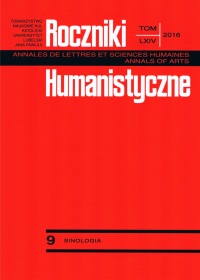Self-Cultivation Xiu Shen—Imitation of Personal Model Junzi in Analects
Abstract
The following paper presents Confucius’ view on self-cultivation. The paper also contains analysis of two concepts: de – virtue and xiao – filial piety. The author argues that those two concepts are basis for moral development as described in Analects. De is inborn, given by tian (heaven) whilst xiao, obedience towards parents and relatives, is aquired by proper education. Furher, the paper outlines three stages of self-cultivation which, in Analects, is learing how to behave morally and according to norms li . First stage of cultivation means that one follows li without any alteration, second stage – one can apply them knownig that some changes can be made. The third stage – junzi stage means that norms li no longer limit a moral person. Junzi follows them because it is his ren nature.
References
Bandura, Albert. Social Learning through Imitation, Nebrasca Symposium on motivation, 1962. W: Maria Ossowska, Ethos rycerski jego odmiany, wyd. 3. Warszawa: Wydawnictwo Naukowe PWN, 2000.
Creel, H[errlee] G[lessner]. Confucius and the Chinese Way. New York: Harper & Bros, 1960.
Durkheim, Emile. Zasady metody socjologicznej, tłum. Jerzy Szacki. Warszawa: Wydawnictwo Naukowe PWN, 2011.
Fingarette, Herbert. Confucius—The Secular as Sacred. Illinois: Waveland Press Inc, 1972.
Hall, David L., Ames Roger T. Thinking through Confucius. New York: SUNY Series Press, 1987.
Kowalski, Mirosław, i Daniel Falcman. Świadomość aksjologiczna i podmiotowość etyczna. Analizy i impresje. Kraków: Oficyna Wydawnicza „Impuls”, 2010.
Lai, Karyn L. „Confucian Moral Cultivation. Some Parallels with Musical Training”. W: The Moral Circle and Self: Chinese and Western Approaches, red. Kim Chong Chong, Sor-hun Tan, C.L. Ten. Open Court: Carus Publishing, 2003.
Lau, D.C., Confucius. The Analects. London: Penguin Books, 1979.
Munro, Donald J. The Concept of Man in Early China. Ann Arbor: University of Michigan Press, Center for Chinese Studies, 1991.
Systemy myślenia ludow Wschodu Indie Chiny Tybet Japonia, red. Hajime Nakamura, Philip P. Wiener, tłum Maciej Kanert, Wisława Szkudlarczyk-Brikic, Kraków: WUJ, 2005.
Pawłowski, Józef. ‘Państwo’ we wczesnej filozofii konfucjańskiej. Warszawa: WUW, 2011.
Schwartz Bebjamin. Starożytna myśl chińska, tłum. Magdalena Komorowska, Kraków: WUJ, 2009.
Szacka, Barbara. Wprowadzenie do socjologii. Warszawa: Oficyna Naukowa, 2003.
Środa, Magdalena. Etyka dla myślących. Warszawa: Wydawnictwo Czarna Owca, 2010.
Tu Wei-ming. „Li as process of humanization”. Philosophy East and West, 22, 2, On Dharma and Li, (Apr., 1972): 187-201.
Confucius and the Analects. New Esseys, red. Bryan W. Van Norden, New York: Oxford University Press, 2002.
Wilson, Stephen A., „Conformity, Individuality and the Nature of the Virtue: A Classical Confucian Contemporary Ethical Reflection”, Journal of Religious Ethics 23 (2) (1995): 263-289.
Zhuzi jicheng. T. I: Yuannjizhe: Guoxue zhenglishe Zhonghua shuju chuban. Shanghai, 1959.
Copyright (c) 2016 Roczniki Humanistyczne

This work is licensed under a Creative Commons Attribution-NonCommercial-NoDerivatives 4.0 International License.





